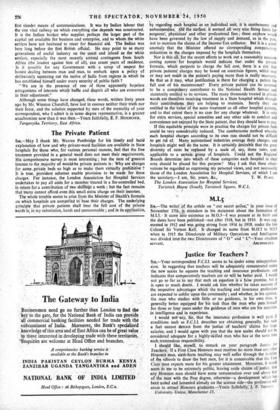Justice for Teachers ?
SIR,—Your correspondent F.C.I.I. seems to be under some misapprehen- sion. In suggesting that teachers will be adequately remunerated under the new scales he equates the teaching and insurance professions, and indicates that comparatively teachers are or will be better paid. I would not go so far as to say that such an equation is a false premise, but it is open to much doubt. I would ask him whether he takes account of the respective advantages which the teaching and insurance professions are expected to confer upon the community ; and whether, in his opinion, the man who studies with little or no guidance, in his own time, is generally better equipped for his task than the man who puts himself for three or four years under the guidance of men who 'are his superiors in intelligence and in experience. I would not 'say, Sir, that the insurance profession is well paid, if conditions such as F.C.I.I. describes are obtaining generally, but such a fact cannot detract from the justice of teachers' claims for large salaries, and I-would agree with you that the new scales should not he considered adequate for a highly-skilled man who has at the same time such, tremendous responsibility. I should like, myself, to remark on your paragraph Justice for Teachers: If a First Class Honours man receives no more than any other Hoponrs man, sixth-form teaching may well suffer through the inability of the schools to draw the best men., for it is conceivable that the First Class man expects more for his greater attainment. Moreover, it would seem me to be extremely politic, leaving aside claims of. justice, that any Honours man should have some remuneration over and above that of the man with the Pass degree, otherwise—'a development which has been noted and lamented already on the science side—the profession will cease to attract Honours graduates.—Yours faithfully,' J. P. ToomEy.
University Union, Manchester 15.














































































 Previous page
Previous page